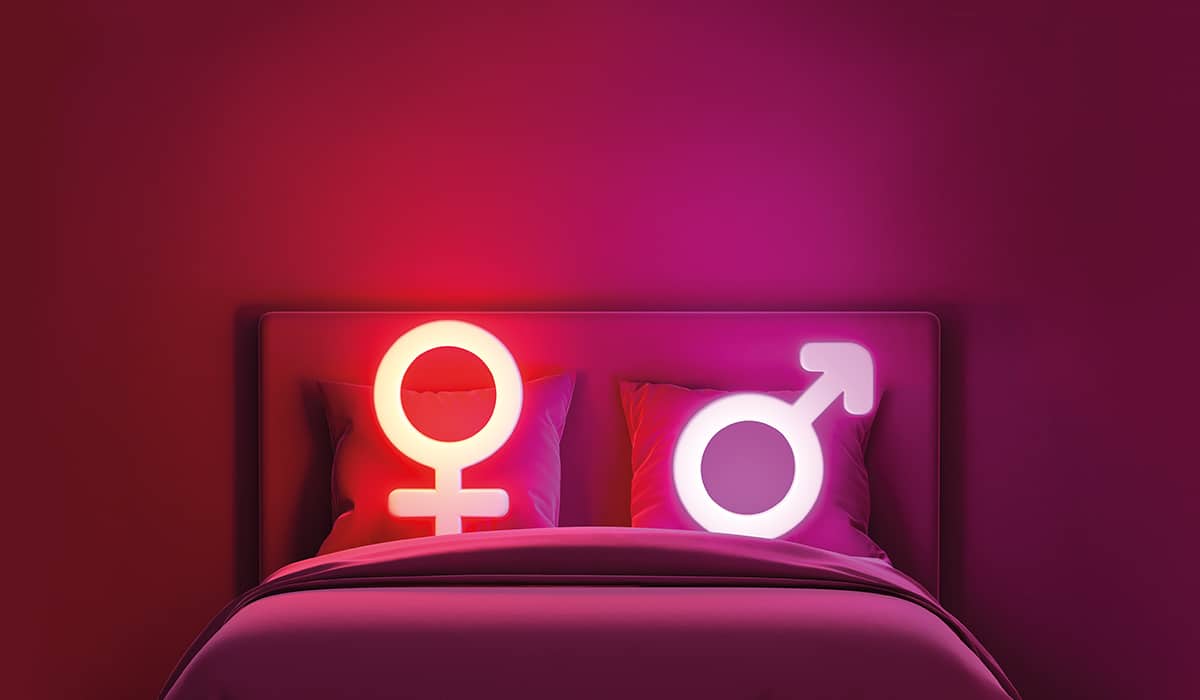The way our bodies and lives change over time can have a big impact on our libido. Sex coach Nicki Brivik shares insights into navigating the perks and pitfalls of each life stage.
When we’re in our frisky 20s, it can be difficult to imagine that sex with our beloved may, one day, hold all the erotic allure of a mouldy dishcloth. Just as it may seem quite a stretch when we’re in the throes of new motherhood, slinging nappies and lactation bras – to conceive that we may yet undergo a kind of second sexual awakening in our forties or fifties.
Though it often seems that we’re living in a society saturated with sex, “we don’t talk about it nearly enough!”. That’s according to sex coach Nicki Brivik. “It’s like we start having sex at age 16, 18, or whenever, and then we never really grow beyond that. When last did you have a conversation about sex with your partner? Suggest trying something new? Tell them about something you like or don’t like? How you’re feeling about sex? What you’d like to feel?”
Nicki advocates for a ‘growth mindset’ when it comes to navigating the hurdles and rewards of each new phase of our sexual evolution. “It’s become very natural for us to adopt a growth mindset in other areas of life – our careers, our personal development, our relationships – why not sex? Sex is how adults play. And goodness knows, we need play as much as children do. It reduces stress, it connects us – it’s so good for our health.”
So what does a growth mindset look like, in relation to sex? “It is about being open to learning and expanding not only our definition of sex – it’s so much more than penetrative sex alone – but also to our knowledge about how we can break out of our patterns to learn and improve and grow.”
In our 20s…
At this age, we might be casually dating, meeting new people and developing crushes. Hormonally speaking, our teens and early 20s are when we’re most fertile, however, research has found that this doesn’t necessarily translate into a high sex drive.
Our 20s are also when we begin to bump up against the disparities between our expectations of sex, and the realities of sex.
“In your twenties, you’re feeling each other out, literally and figuratively. You’re also feeling yourself out,” says Nicki. “There may be a lot of shame and expectation to work through. We’ll bump up against fictions or myths we’ve absorbed about how sex is or should be, how we or our partner should be… We are just trying to figure out what works for us, what feels good.”
In addition, our late teens or twenties maybe when we first start taking contraceptive pills, antidepressants or anti-anxiety medication, each of which can have a dampening effect on libido.

In our 30s…
This can be a contradictory phase, sexually speaking, for women. Our sex drive increases in our 30s, but our interest in sex also declines if we’re nurturing young children and there is a fascinating corresponding hypothesis.
One study found that from late 20s through to early 40s, women think more about sex, have more frequent and intense sexual fantasies, and are more willing to engage in sexual intercourse.
The study’s author suggests that this higher sex drive in childless women (or mothers whose children are older) may be a response to declining fertility levels. In other words, nature is giving us an incentive to make the most of our reproductive mojo while we still can. (Thanks, nature!)
“My best advice for new moms is to schedule a date night so that they can find the time to connect with their partner, not as a mother but as a person,” advises Nicki. “You may need reminding that you are more than just a mother. A date night (or morning, or afternoon) allows desire to flourish away from the daily grind of life’s responsibilities.”
In our 40s..
“Your forties can actually be a fabulous age for sex,” says Nicki. “If you have children, they’re usually getting a little bit older, so you can start focusing on yourself and your partner again. Plus, you’ve got that extra confidence that comes from experience, from feeling more comfortable in your own skin – you are not afraid to ask for what you want.”
On the flip side, there is also a chance we may be feeling ashamed of our bodies: childbirth may have left its mark, and our metabolism may be slowing down thanks to declining oestrogen levels, which can lead to weight-gain. Many women begin to experience symptoms of perimenopause in their 40s (and even late 30s), which can include trouble sleeping, mood fluctuations, vaginal dryness, hot flushes and more – all of which can really put a dampener on desire.
Talk to your doctor or gynaecologist about treatment options – one of which might be hormone replacement therapy (HRT). A number of women report that this method has helped improve the symptoms of perimenopause and their sex drive – including Nicki.
“I didn’t actually realise that I was deep into perimenopause because even though I had symptoms and I still enjoyed sex, it seemed to take longer and longer to ‘get going’ – I didn’t realise what it was, so I just soldiered on. But when I was finally tested and put on hormones, I couldn’t believe the difference it made. Oh my gosh, the orgasms!”
In our 50s+…
Some women in this age bracket feel that the extra time and energy they now have available after their children have ‘flown the coop’ is liberating, which can lead to an increase in desire. “There’s also this sense of carpe diem, seize the day, you know?” says Nicki. “It’s like, wow, I still function, I’m still healthy – I may not look as good as I did in my 30s, but I look better now than I will in my 70s, so let me make the most of the time I have while I still can!”
A good quality lubricant may become a permanent fixture on your nightstand, as vaginal dryness is more likely to become a problem during intercourse. Erectile dysfunction is also most likely to affect men in this age bracket (and older) thanks to declining testosterone levels, so you may have to find more creative ways to share pleasure (and/or seek medication for him).
None of this is to say that you can’t have an active sex life well into old age: there is research suggesting that people who are in their 60s and beyond are fully capable of having active, fulfilling sex lives as long as any underlying health issues are addressed, and you have a willing partner!
Nicki Brivik: asknicki.co.za
Words: Robyn Maclarty
Photography: Getty Images







